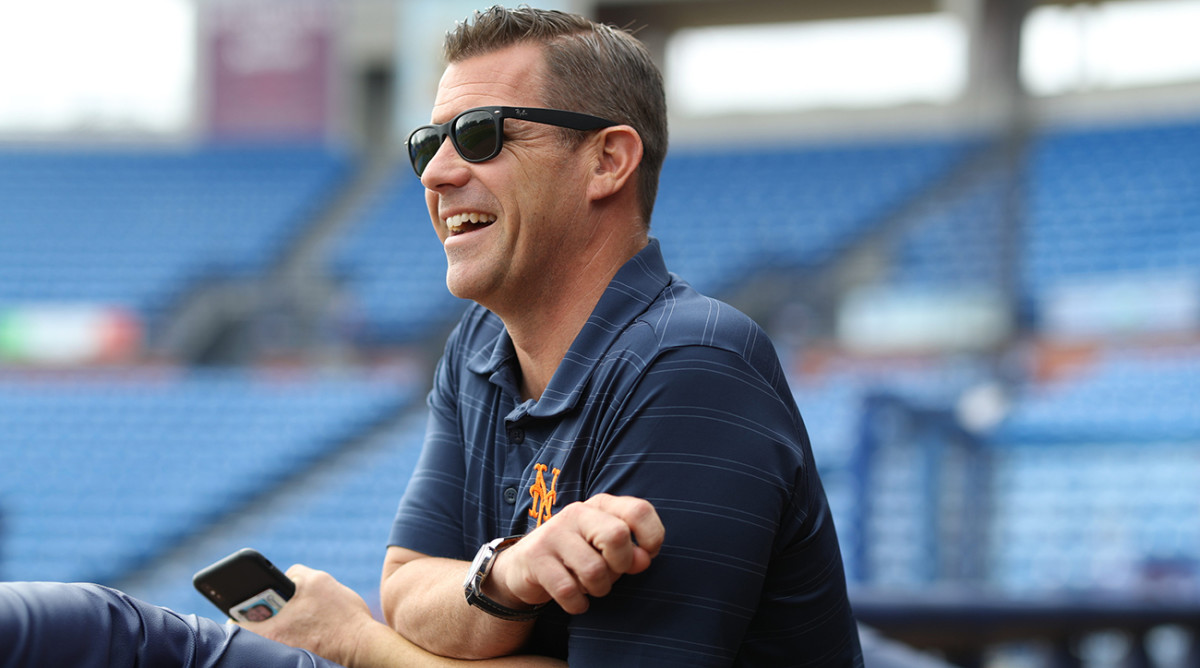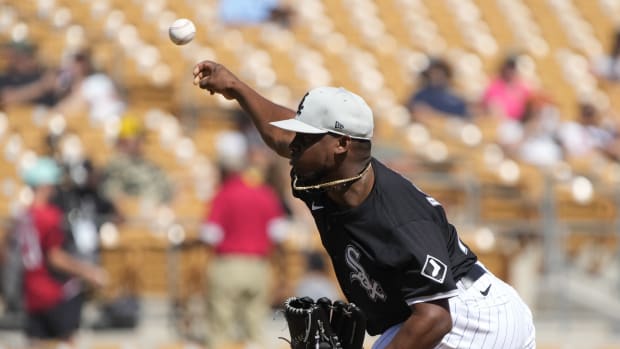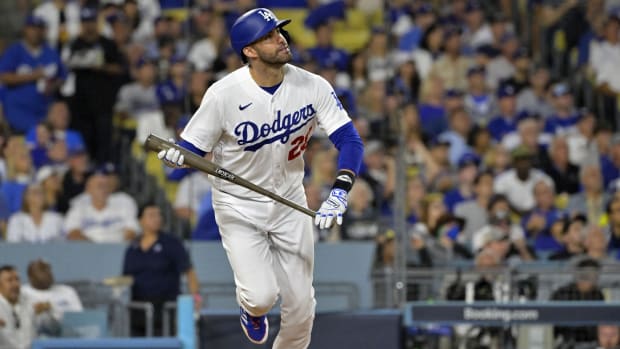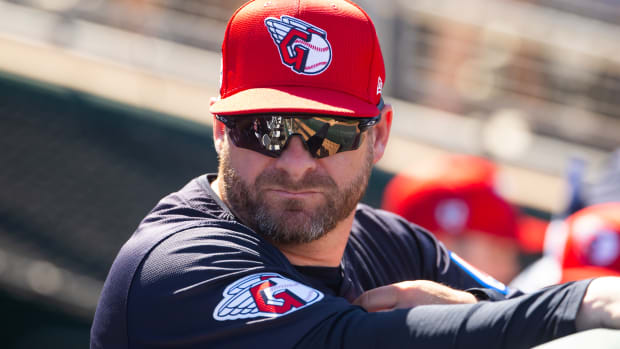King of Queens: Brodie Van Wagenen Is Determined to Put the Mets Back on the Map

This story appears in the April 8, 2019, issue of Sports Illustrated. For more great storytelling and in-depth analysis, subscribe to the magazine—and get up to 94% off the cover price. Click here for more.
On the ninth day of his new job, Brodie Van Wagenen appeared to forget which side he was on. The Mets' 45-year-old general manager welcomed Casey Close into the team suite at the Carlsbad, Calif., Omni hotel at November's GM meetings. Once partners as agents, then rivals, the two were about to embark on a new relationship across the negotiating table. Van Wagenen reached for his information on the year's free-agent class. Close laughed. "You might need a new folder," he said.
The clear plastic sleeve carried the logo of Creative Artists Agency, the firm whose baseball division Van Wagenen had led for 12 years and just left; he and Close had been colleagues there from 2006 to '11. That weekend Van Wagenen and his wife, Molly, scoured their Connecticut home for CAA merchandise. They gave away two bags' worth of polos, T-shirts and totes, and threw out Molly's favorite running hat. (Brodie replaced it with six Mets caps.) When he got to Port St. Lucie, Fla., for spring training, he bought several dozen $4 notebooks at Kinko's and affixed Mets logos to them.
Now Van Wagenen seems at home even on the road, sauntering through Nationals Park on Opening Day. He assumes his standard pose—right hand in his pocket, left gripping his iPhone—and greets his own employees and Washington's with similar exuberance. "Great to see you!" he says to one. "You're the key to the season!" he shouts to another. He encourages a half-circle of reporters to check out a nearby seafood spot, The Salt Line. (After it's mentioned that one of the owners is Nats first baseman Ryan Zimmerman, a longtime CAA client, Van Wagenen laments that he no longer eats for free there.) He is unfazed when a security guard asks him to show ID. "Hopefully I won't get carded at home," he cracks later.
Van Wagenen wasted no time in his new job, spending the winter remodeling the roster of a 77-win team into an NL East contender. On the eve of the season, he shocked and delighted fans by doing the clear right thing and extending 2018 NL Cy Young winner—and CAA client—Jacob deGrom with the second-largest deal in club history: $137.5 million over five years. That move was a big step in eradicating what he calls "the culture of negativity" at Citi Field. "I think that most Mets fans wake up defeated," he says. "I wanted Mets fans to wake up with the belief that winning is the only outcome that they can expect."
The negativity is hard-earned. The Mets reached the World Series in 2015 and made the NL wild-card game in '16. But those were their only winning seasons in this decade, and the organization has drawn criticism for its stinginess and an unceasing capacity for slapstick. Every baseball team makes mistakes; only one has accidentally tweeted a picture of a sex toy inside its clubhouse.
Reshaping the image of a franchise is a tall order. Van Wagenen began with the player he considers most important to the team's future. Twenty-seven hours before the season opened in Washington, Van Wagenen sat in a conference room the Mets had reserved at Sarasota-Bradenton International Airport, while the rest of the club assembled in Syracuse, N.Y., for a final preseason workout. Van Wagenen and deGrom missed the team flight; neither would board a plane, the Mets had decided, until the deal was done.
"It was a little unconventional," Mets COO Jeff Wilpon says. He's being polite. Wilpon reads the papers. The hire caused rival executives to roll their eyes and other agents to scratch their heads. New York had passed over Doug Melvin, a Brewers senior adviser and former GM, and Chaim Bloom, the Rays' young VP of baseball ops, for an agent with no front-office experience?
"Well, we always have fans who want to be the GM," Wilpon jokes. "So we picked a fan, and now he's a GM."
Players' association president Tony Clark said his constituents were concerned, fearing that Van Wagenen had information on players that could be used against them in negotiations. Agents also wondered aloud about the potential for conflict of interest. "I really don't see the reality in those comments," Van Wagenen says. "My job is to help the team win games. And because I believe that players should be rewarded fairly for their production, I'm not looking to suppress salaries unfairly.... I think that the majority of people who are concerned with that conflict of interest are trying to be opportunistic about their own business growth."
Before hiring Van Wagenen, Wilpon and his majority-owner father, Fred, held extensive meetings with their attorneys. They decided that Van Wagenen would recuse himself from all salary-arbitration negotiations in his first year because he had led that process for CAA. Jeff Wilpon also announced at the GM's introductory press conference that Van Wagenen would stay out of extension discussions with deGrom and Noah Syndergaard, also a former client.
In January, in his Citi Field office, the GM walked that back. "Moving forward, any major decision that affects our payroll going forward, that affects the roster decision of our team, I'll be involved in," he said. "Both of those players as well as many other players on the team are going to impact our long-term success, and I'll be involved."
Later, when he heard that statement, Wilpon paused. "We'll talk about that," he said.
Two months later Van Wagenen consummated the deGrom extension over 7-Eleven tacos (10 for $2). He had been deGrom's primary agent at CAA since 2013 and at last year's All-Star Game had publicly blasted the Mets, telling them to extend his client or trade him, but this was the first time deGrom had really seen him work. At times negotiations grew contentious. As Van Wagenen shouted back and forth with CAA's Jeff Berry, his longtime partner, Wilpon and deGrom locked eyes across the table and grinned. Nearly nine hours after they gathered, the men stood and shook hands. Van Wagenen and deGrom hugged. Naturally, Van Wagenen tweeted a photo commemorating the occasion.
Sometimes Molly Van Wagenen will see that her husband has emailed her a listing for a new house that they both know they will never inhabit. Since he was a muscle-tank-wearing Stanford undergrad in 1992 with an earring in his left lobe—neither the piercing nor the dozen long-stemmed roses he sent to her dorm before their first date aided his cause, but they persevered—Brodie has always liked the idea of change. But when he mentioned that a phone call with Wilpon that started with "Do you have any suggestions for outside-the-box candidates for GM?" had bled unexpectedly to "Could you be that outside-the-box candidate?" Molly was skeptical. She wasn't sure that the Mets would be a good fit.
"I wanted to make sure ... that if he has a vision, he would be able to have the tools to implement that vision," she says. "I think it's pretty dangerous to make a change just because you're burned out and assume that it's going to be better."
Brodie learned much of his worldview from Molly. She was a diver who made the dean's list; he did not buy a book in college. She took a military history class with Condoleezza Rice and came out brimming with ideas: Negotiate from a set of facts; when you make progress, don't change your goal; hire people smarter than you. From Mindset, by Carol Dweck, she learned to be open about failure. She and Brodie discuss these ideas daily.
Van Wagenen insists that he never wanted to be a GM, that he never fell asleep picturing his draft board or daydreamed about 40-man roster construction. He arrived at Stanford from Northridge, Calif., as an infielder and left as a baseball nut whose injuries had kept him from becoming a prospect. He watched his friends sign with agents ... then watched those agents drop them when they struggled. It shouldn't be like that, he thought. He joined IMG at 28 in 2001 and soon paid his own way to Sicily to market himself to Team USA. His firstborn, Piper, was only a few days old when he left. He signed three clients. Over the years he gained a reputation as a straight shooter who would help former clients plan their second careers gratis.
In 2006 he and Close cofounded CAA's baseball division. Van Wagenen negotiated hundreds of millions of dollars' worth of contracts, yet he takes just as much pride in the Christmas cards Ryan Zimmerman exchanges with his 13-year-old son, Jack. The desire to be with his family more factored into his decision to take the GM job. He had grown tired of 150 nights on the road per year, the missed birthday parties and soccer games and school plays.
He says he had received similar job offers in the past, but "New York City was the platform that I wanted." Van Wagenen spent much of his initial interview, with Wilpon and interim GM John Ricco, detailing the problems he saw with the franchise. Van Wagenen had developed strong opinions through his access to the Mets' clubhouse and to CAA's season tickets; he attended 50 games at Citi Field last year. He could also lean on his longtime relationship with Wilpon, with whom he plays golf several times a year. The conversation was at times uncomfortable, but Wilpon says, "It probably helped him get the job, to be that honest and open."
Van Wagenen is always aware of image. "We are in the entertainment business," he likes to say. In addition to exit velocity and spin rate, he calculates how a player will resonate with the fan base. As an agent, he sold the Mets on outfielder Yoenis Céspedes in 2016 with a presentation that included the number of tabloid back pages on which Céspedes had appeared.
His first few moves as GM reflect what he says is a long-held belief: Tanking is a scourge. He acquired All-Star closer Edwin Díaz and eight-time All-Star second baseman Robinson Canó from the Mariners and signed All-Star infielder Jed Lowrie and All-Star catcher Wilson Ramos. The mind-set that pervades the game—aim to win 100 games or lose 100 games—has contributed to a shrunken pool of teams willing to spend to compete, which could lead to what he calls "labor Armageddon." He tweeted his concerns last February.
"There is a rising tide among players for radical change," he wrote. "A fight is brewing, and it may begin with one, maybe two and perhaps 1,200 willing to follow. A boycott of spring training may be a starting point, if behavior doesn't change."
He demurs today, referring to himself as a "bridge." But the Chicago Tribune story about his statement still hangs, framed, in his basement.
Before taking the job, Van Wagenen, who calls himself "a player advocate in the front office," insisted that the Wilpons increase not only player payroll but also the budget for analysts, scouts and technology. He also values diversity; he has brought in U.S. Olympic softball player Jessica Mendoza as a baseball operations adviser. (As an analyst at ESPN, she too must navigate conflicts of interest.) Van Wagenen works the clubhouse daily. Every morning this offseason he texted first base prospect Pete Alonso, whom the club had asked to lose weight; Alonso sent his boss photos of the scale and eagerly awaited the praise that came back. (He dropped 12 pounds, to 240.)
But most of all, Van Wagenen sees himself as a stargazer whose telescope is pointed on the future of baseball. He regularly asks his teenage children—daughter Piper and sons Rafe and Jack—for input on what interests them about the game and what doesn't. He believes that marquee names drive the game, noting that Syndergaard bobblehead night sold out Citi Field last year, even though Syndergaard was on the disabled list. He believes his approach and openness to new ideas can help change the sport he loves. Molly smiles as she relates what she calls their family's life motto: Start with yes.
Yes is not always so easy to find in Queens. The Wilpons are known as micromanagers whose leadership has resulted in three playoff appearances in 16 years. In the wake of the revelation a decade ago that the club had been financed in large part by proceeds from Bernie Madoff's Ponzi scheme, the family has guarded the details of its assets even more closely. The Mets play in the biggest market in the country yet most seasons have a league-average payroll. Fans wake up defeated because most of the time the team is.
Much of the Mets' future will depend on ownership's willingness to open the checkbook. Before taking the job, Van Wagenen told the Wilpons that he believed extending deGrom was one of the keys to his vision. They said they were prepared to shell out to keep him.
The GM had answered the most pressing question hanging over his team. But he continues to toe a difficult line, balancing his flair for the stage with ownership's need for control. In a January press conference introducing Lowrie—a former CAA client—Van Wagenen appeared to speak off the cuff when he issued a challenge to the rest of the NL East: "Come get us." But he had cleared the line with Wilpon beforehand. Van Wagenen knows what side he's on.






































